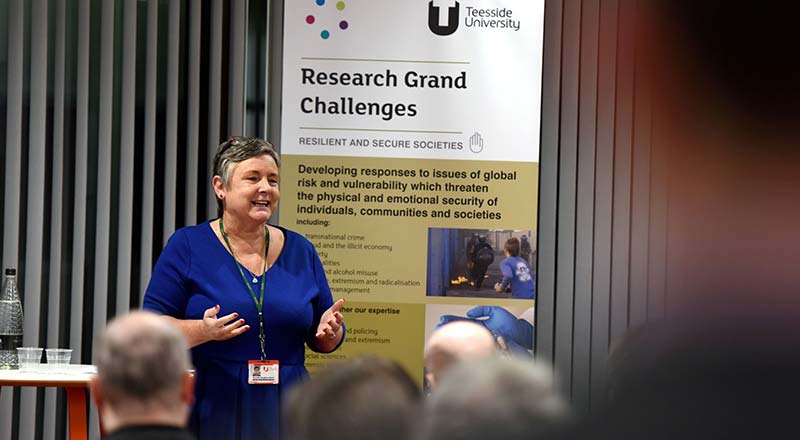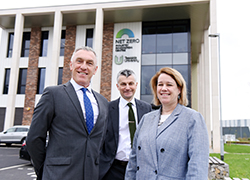Research highlights the impact of COVID-19 on the local community
Experts at Teesside University are spearheading a range of pioneering research projects designed to look at the impact of COVID-19 and examine how to support the local community as we continue to move out of lockdown.

Subjects currently being tackled include the mental health of parents, the effects of lockdown on the development of young children and the changing habits in relation to alcohol consumption.
The researchers are working closely with Middlesbrough Council and public health partners on the community-based projects with the aim of providing evidence and guidance on how COVID-19 has impacted people’s lives and what decisions need to be made to provide support moving forward.
The work is being led by Team Alpha (Alcohol and Public Health Research Team), a specialist group of researchers and academics based within Teesside University’s School of Social Sciences, Humanities & Law.
They have recently completed a study with Middlesbrough Council looking at COVID-19 recovery from a community perspective in which they interviewed over 50 people on a range of different themes.
Subjects covered included mental health and wellbeing, control (and lack of control), economic concerns, the concept of community and the hidden cost of COVID-19.
Many of those interviewed spoke about their experiences and struggles with authority during the pandemic and the helplessness they felt with not being able to control their own lives.
Trust, and who to believe, was a big issue for many and a lot of the people who took part in the study struggled with the concept that they had lost control over what they could do in their day to day lives.
One participant commented: “The only thing I can do at the minute is eat, sleep and work and that’s it. That’s all I can do, that’s my life now.”
A large proportion of interviewees also spoke about how they had noticed more community cohesion and an increase in community spirit, particularly in the early stages of lockdown.
“There was a really nice feeling of community spirt and that we were all in this together,” commented one participant.
Struggles with mental health, experiencing domestic abuse and concerns over alcohol and drug issues were also highlighted by people in the study.
One participant spoke candidly about their experience of fleeing intimate partner abuse during lockdown – from suffering the direct effects, to the process of fleeing her abuser and accessing support.
A number of recommendations have been made following the study which, the researchers say, can assist the community with COVID recovery. These include:
- Mental health to be a priority as we move out of isolation – particularly for young people
- Communication to be carefully framed – avoiding imperatives where possible
- The need to better understand the reasons for “mistrust” over official information
- Provide people with choices over their own lives
- Ensure information at a local level is supported and emphasised
This community-based research has provided us with an in-depth understanding of how local people feel about the impact of the pandemic, the issues that need to be addressed and the support which is needed moving forward.
Teesside University Research Associate Dr Andrew Divers led the study and worked alongside Clifford Johnson and Parisa Diba. He recently presented some of the findings from the study at the 3rd International Gender Conference, jointly organised by Symbiosis School for Liberal Arts and De Paul University, Chicago, where he spoke specifically about domestic abuse during the pandemic.
He said: “The impact of COVID-19 has been felt by everyone. But, for some, it has been felt more deeply and has affected their lives more significantly than others.
“This community-based research has provided us with an in-depth understanding of how local people feel about the impact of the pandemic, the issues that need to be addressed and the support which is needed moving forward.
“A key part of ensuring that COVID recovery is successful is ensuring that as many people as possible are committed to the notion of that recovery and to any proposed measures that may be implemented.”
The researchers from Team Alpha are now moving on to another phase of their work which, again, will be carried out in partnership with Middlesbrough Council.
They have already launched a study examining how the alcohol habits of people in Middlesbrough have changed during the pandemic – with over 400 responses so far.
They are also in the early stages of setting up a project to examine how the pandemic has affected the mental health of parents and are interested in examining whether there has been any negative impact on babies born during lockdown.
Professor Dorothy Newbury-Birch leads Team Alpha at Teesside University and said: “There are so many different strands to this research and we are pleased to be able to work with our local partners and the members of the community to address a wide range of issues as we look ahead to COVID recovery.
“It is important to address how people feel and what elements of recovery they would like to see. Our job is to analyse this and work with the local authority and public health teams to help them make quick, decisive and informed decisions.”
Councillor Dorothy Davison, Middlesbrough Council’s Executive Member for Adult Social Care and Public Health, said: “There is no doubt that the ongoing effects of Covid will be deep and long lasting in many ways. The research carried out by Teesside University in partnership with Middlesbrough Council will allow us to create a clearer picture of a number of issues, including increased alcohol consumption during the pandemic, which will in turn help to inform our approaches best to meet those challenges.”
 International partnership signed with prestigious American
...
International partnership signed with prestigious American
...